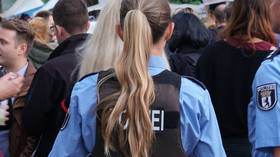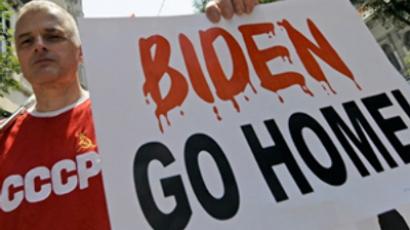ROAR: Russian Opinion and Analytics Review, Apr.14

This Tuesday ROAR looks upon NATO through the eyes of a French politician, hails the lack of violence in the Georgian street protests and presents an opinion on the recent events in Moldova, Georgia and elsewhere.
Jean-Marie Bockel, the French Secretary of State for defense and veterans’ affairs, writes in NEZAVISIMAYA GAZETA that, at the present moment of history, NATO needs to remember its initial call and function, which is to serve as a platform for the construction of collective security in Europe and elsewhere in the world.
The decision by France to reinstate its full membership in the military organization of the alliance completely agrees with the place which France, as a major power, occupies today in the world, writes the Secretary. He adds that the changes caused to NATO by the ending of the Cold War facilitated the return of France to the military side of the alliance.
The Secretary considers cooperation between NATO, the EU and Russia paramount for European security and names Central Asia, the Black Sea and the Caspian, and the Arctic region as areas where that cooperation may bear the best fruit. Cooperation is necessary in such spheres as countering the strategic impact of global warming, facilitating the free flow of goods and people across borders and liberalization of trade.
In the same newspaper, analyst and commentator Yury Simonyan writes that the main success of the recent Georgian street protests is the fact that these protests never turned violent and drew no violent reaction from the government, apart from the totally senseless attack on the opposition’s press center.
The commentator says that today, after the events, it is clear that the protests could never have achieved the goal that the opposition had professed to pursue: the resignation of Mikhail Saakashvili. For six months, he writes, the opposition leaders in Georgia had been saying that on April 9 Saakashvili would go, and they never accepted any doubts. For six months government figures had been saying that Saakashvili would stay in power under any circumstances, and had no words to explain why.
The author believes that the lack of unity and the absence of one leader accepted by all others as the supreme leader of the opposition played a bad joke on the whole movement. The opposition approached the appointed date of April 9 without a leader and with wrong priorities. The government entered the stage of that dramatic day without the slightest idea of what was to be done about the opposition.
As a result, says the author, neither side performed up to its supporters’ expectations. Luckily there was no bloodshed.
Simonyan writes that for the opposition it was definitely a failure, but it wasn’t a victory for the government. Nobody can speak of victories if an 80,000 strong crowd gathers to march against the government, even if it disperses eventually. Georgia, says the author, has many problems which are gaining in complexity and severity.
They may take the country all the way to that boiling point when presidents are propelled out of their chairs by the pressure of the steam. Before it happens, the author suggests that the two sides sit down and discuss the matters together – if they are still flexible enough to negotiate.
In IZVESTIA, Vitaly Ivanov of the Institute of Politics and State Law writes that, looking with sadness and pity at what has been going on in Georgia and Moldova, he is tempted to say, like the doctor in an old joke who examines his patient’s many ailments and says ‘Good. Very and very good. Very good it’s not me who’s got all these…’ It is good that it has not been happening to us here in Russia.
It actually couldn’t have happened here, continues the writer. After the ‘Orange’ movement started in Ukraine and elsewhere, the Russian powers-that-be prescribed an anti-Orange prophylactic. It caused a stir among the Liberals, who said the state was fighting ‘an imaginary threat.’ However the elections that followed demonstrated with rare clarity that ‘Orangism’ doesn’t grow on the soil protected from it, even if the seeds are in the soil.
The writer says that the pogroms in Moldova and the zero-gain protests in Georgia have shown Russia’s Liberals that Orangism without the support of the US, which lacked in both cases and without the laxness of security, which doesn’t often occur in Russia, leads only to a senseless loss of time, effort and property. For the Liberals, the best mode of conduct for now is to start looking for ways that could lead them back into the officially existing political system.
Evgeny Belenkiy, RT













